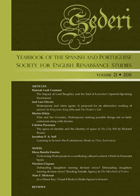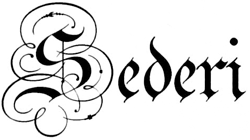
Sederi 21
Sederi 21 — 2011
EDITORS
Berta Cano Echevarría & Ana Sáez-Hidalgo
REVIEW EDITOR
Francisco J. Borge López
ISSN 1135-7789
José Luis Oncins Martínez, “Shakespeare and Chess Again: A Proposal for an Alternative Reading of pawn(s) in King Lear, King John and The Winter’s Tale.” SEDERI 21 (2011): 29-47.
DOI: https://doi.org/10.34136/sederi.2011.2 Download PDF
Abstract
For the last three centuries, Shakespeare’s plays have been continuously glossed, commented on and annotated. However, there still remain quite a few obscure passages and complex words which continue to puzzle and cause debate as to their precise meanings. One such word is pawn, glossed as a pun in some editions of King Lear, and passed over in silence in other plays where it appears in similar contexts. This essay proposes an alternative reading of the word in King Lear, King John and The Winter’s Tale. The hypothesis put forward is that Shakespeare was indeed hinting at the various senses of this word and exploiting its punning potential in these three plays. This suggestion is supported by a series of examples of similar rhetorical exploitation of this polysemic word as found in several contemporary authors. These examples will demonstrate that the various senses of the word were indeed very much alive in Elizabethan England – and quite probably in Shakespeare’s mind.
Keywords: Shakespeare’s style; chess; metaphor; wordplay; pun.
References
Shakespeare’s plays
King John
Shakespeare, William 1919 (1623). King John. A New Variorum Edition. Ed. Horace H. Furness. Philadelphia.
Shakespeare, William 1936 (1623). King John. The New Shakespeare. Ed. John D. Wilson. Cambridge: Cambridge University Press.
Shakespeare, William 1954 (1623). King John. The Arden Shakespeare (2nd series). Ed. E. A. J. Honigmann. London.
Shakespeare, William 1966 (1623). King John. The Signet Shakespeare. Ed. William H. Matchet. New York: New American Library.
Shakespeare, William 1974 (1623). King John. New Penguin Shakespeare. Ed. R. L. Smallwood. Harmondsworth: Penguin.
Shakespeare, William 1989 (1623). The Life and Death of King John. Ed. A.R. Braunmuller. Oxford: Oxford University Press.
Shakespeare, William 1990 (1623). King John. Ed. Lester A. Beaurline. Cambridge: Cambridge University Press.
King Lear
Shakespeare, William 1880 (1608). King Lear. A New Variorum Edition. Ed. Horace H. Furness. Philadelphia: J.B. Lippincott & co.
Shakespeare, William 1901 (1608). King Lear. The Arden Shakespeare. Ed. W. J. Craig. London: Methuen.
Shakespeare, William 1952 (1608). King Lear. The Arden Shakespeare (2nd series). Ed. K. Muir. London.
Shakespeare, William 1993 (1608). King Lear. Ed. J. F. Andrews Everyman.London: J.M. Dent Sons.
Shakespeare, William 1993 (1608). King Lear. Eds. B. Mowatt and P. Werstine. The New Folger Library, Washington Square Books, New York.
Shakespeare, William 1997 (1608). King Lear. The Arden Shakespeare (3rd series). Ed. R. A. Foakes. London.
Shakespeare, William 2000 (1608). King Lear. Ed. S. Wells. Oxford: Oxford University Press.
The Winter’s Tale
Shakespeare, William 1898 (1623). The Winter’s Tale. A New Variorum Edition. Ed. Horace H. Furness. Philadelphia: J.B. Lippincott & co.
Shakespeare, William 1931 (1623). The Winter’s Tale. The New Shakespeare. Eds. Sir Arthur Quiller-Couch and J. Dover Wilson. Cambridge: Cambridge University Press.
Shakespeare, William 1963 (1623). The Winter’s Tale. The Signet Shakespeare. Ed. Frank Kermode. New York: Signet Classics.
Shakespeare, William 1963 (1623). The Winter’s Tale. The Arden Shakespeare. Ed. J. H. P. Pafford. London: Methuen.
Shakespeare, William 1969 (1623). The Winter’s Tale. New Penguin Shakespeare. Ed. Ernest Schanzer. Harmondsworth: Penguin.
Shakespeare, William 1996 (1623). The Winter’s Tale. The Oxford Shakespeare. Ed. Stephen Orgel. Oxford: Oxford University Press.
Other plays by Shakespeare
Shakespeare, William 1998 (1598). Henry IV, Part I. Ed. David Bevington. Oxford: Oxford University Press.
Shakespeare, William 1968 (1600). Henry V. Ed. Arthur R. Humphreys. Harmondsworth: Penguin.
Shakespeare, William 1999 (1594). Henry VI. Part 2. The Arden Shakespeare. Ed. Ronald Knowles. London: Arden Shakespeare.
Shakespeare, William 1982 (1623). The Taming of the Shrew. Ed. H. J. Oliver. Oxford: Oxford University Press.
Shakespeare, William 1974. The Riverside Shakespeare. Ed. G. Blakemore Evans. Boston: Houghton Mifflin.
Shakespeare, William 1980. The Works of William Shakespeare. Ed. David Bevington. Glenview: Scott, Foresman and Company.
Other works cited
Astrana Marín, Luis ed. and trans. 1928. El rey Lear. William Shakespeare: Obras Completas. Madrid: Aguilar.
Bacon, Francis 1857 (1604). “An Apologie in Certaine Imputations Concerning the Late Earle of Essex.” Ed. James Spedding et al. The Works of Francis Bacon. Vol X. London: Longman and Co. 139-162.
Blake, Norman F. 1999. “The Study of Shakespeare’s Language: Its Implications for Editors, Critics and Translators.” SEDERI 10: 11-29.
Bulman, James C. 1985. “Shakespeare Georgic Histories.” Shakespeare Survey 38: 37-48.
Coquillette, Daniel R. 1992. Francis Bacon. Stanford: Stanford University Press.
Conejero, Manuel Á. et al. ed. and trans. 1995. El rey Lear, de William Shakespeare. Instituto Shakespeare de Valencia. Madrid: Cátedra.
Crane, M. T. 2001. Shakespeare’s Brain: Reading with Cognitive Theory. Princeton and Oxford: Princeton University Press.
Crystal, David 2004. Shakespeare’s Words: A Glossary and Language Companion. Harmondsworth: Penguin.
Empson, William 1930. Seven Types of Ambiguity. London: Chatto and Windus.
Empson, William 1951. The Structure of Complex Words. London: Chatto and Windus.
Foster, John 1908. A Shakespeare Word-Book: being a glossary of archaic forms and varied usages of words employed by Shakespeare. London: George Routledge & Sons.
Freeman, Donald C. 2002. “Afterword.” Eds. E. Semino and J. Culpeper. Cognitive Stylistics: Language and Cognition in Text Analysis. Amsterdam: John Benjamins. 319-324.
Freeman, Donald C. 2004 (1995). “’Catch[ing] the nearest way’: Macbeth and cognitive metaphor.” Eds. J. Culpeper, M. Short and P. Verdonk. Exploring the Language of Drama: From Text to Context. London and New York: Routledge, The Interface Series. 96-111.
Jonson, Ben 2000 (1632). The Magnetic Lady. The Revels Plays. Ed. Peter Happé. Manchester: Manchester University Press.
Lewis, Clive. S. 1960. Studies in Words. Cambridge: Cambridge University Press.
Loughrey, Bryan and Taylor, Neil 1982. “Ferdinand and Miranda at Chess.” Shakespeare Survey 35: 113-118.
Lyly, John 1902 (1589). “Pappe with a Hatchet.” Ed. Richard W. The Complete Works of John Lyly. Vol. III. 3 vols. Oxford: Clarendon Press.
Lyly, John 1902 (1578). “Euphues. The Anatomy of Wit.” Ed. Richard W. Bond. The Complete Works of John Lyly. Vol. I. 3 vols. Oxford: Clarendon Press.
Mahood, Molly M. 1957. Shakespeare’s Wordplay. London and New York: Methuen.
Middleton, Thomas 1966 (1624). A Game at Chess. New Mermaids. Ed. J. W. Harper. London: Ernest Benn.
Middleton, Thomas 1993 (1624). A Game at Chess. The Revels Plays. Ed. T. H. Howard-Hill. Manchester: Manchester University Press.
Muir, K. 1950. “The Uncomic Pun.” Cambridge Journal 3: 472-485.
The Oxford English Dictionary (2nd ed.) 1989. Oxford: Oxford University Press.
Onions, Charles Talbut 1911 (1986). Shakespeare Glossary. Oxford: Clarendon.
Parker, P. 1996. Shakespeare from the Margins: Language, Culture, Context. Chicago: Chicago University Press.
Poole, William 2004. “False Play: Shakespeare and Chess.” Shakespeare Quarterly 55/1: 50-70.
Pujante, Angel L. ed. and trans. 1983. Una partida de ajedrez. Thomas Middleton. Murcia: Universidad de Murcia.
Pujante, Angel L. 1985. “La insinuación y el equívoco en A Game at Chess, de Thomas Middleton.” Cuadernos de Filología Inglesa 1:7-16.
Pujante, Angel L. ed. and trans. 1992. El rey Lear, de William Shakespeare. Madrid: Espasa-Calpe.
Schmidt, Alexander 1971 (1902). Shakespeare Lexicon and Quotation Dictionary (revised by G. Sarrazin). 2 vols. New York: Dover Publications.
Tilley, Morris P. 1926. “A Parody of Euphues in Romeo and Juliet.” Modern Language Notes 41/ 1: 1-8.
Traugott, Elizabeth C., and Dasher, Richard B. 2002. Regularity in Semantic Change. Cambridge: Cambridge University Press.
Valverde, José Mª 1967. King Lear. Shakespeare. Obras Completas. Barcelona: Planeta.
Yachnin, Paul 1982. “A Game at Chess and Chess Allegory.” Studies in English Literature, 1500-1900 22/2: 317-330.
